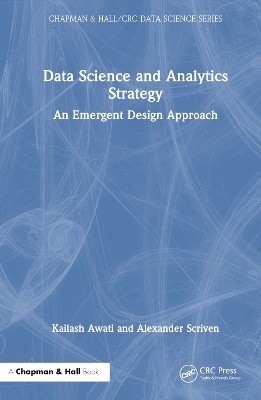
Data Science and Analytics Strategy
Chapman & Hall/CRC (Verlag)
978-1-032-19633-6 (ISBN)
This book describes how to establish data science and analytics capabilities in organisations using Emergent Design, an evolutionary approach that increases the chances of successful outcomes while minimising upfront investment. Based on their experiences and those of a number of data leaders, the authors provide actionable advice on data technologies, processes, and governance structures so that readers can make choices that are appropriate to their organisational contexts and requirements.
The book blends academic research on organisational change and data science processes with real-world stories from experienced data analytics leaders, focusing on the practical aspects of setting up a data capability. In addition to a detailed coverage of capability, culture, and technology choices, a unique feature of the book is its treatment of emerging issues such as data ethics and algorithmic fairness.
Data Science and Analytics Strategy: An Emergent Design Approach has been written for professionals who are looking to build data science and analytics capabilities within their organisations as well as those who wish to expand their knowledge and advance their careers in the data space. Providing deep insights into the intersection between data science and business, this guide will help professionals understand how to help their organisations reap the benefits offered by data. Most importantly, readers will learn how to build a fit-for-purpose data science capability in a manner that avoids the most common pitfalls.
Kailash Awati is a data and sensemaking professional with a deep interest in helping organisations tackle complex problems. He is an Adjunct Fellow in Human-Centred Data Science at the UTS Connected Intelligence Centre and a Data and Insights Manager at a government agency. Over the last decade, he has established data capabilities in diverse organisations using the principles described in this book. In addition to his work in industry, he has developed and taught postgraduate courses in machine learning and decision-making under uncertainty. He is the co-author of two well-regarded books on managing socially complex problems in organisations: The Heretic’s Guide to Best Practices and The Heretic’s Guide to Management. Alexander Scriven is a senior data scientist at Atlassian in Sydney, Australia, and has experience across start-ups, government, and enterprise building analytical capacities and executing on data science projects. He greatly enjoys teaching and mentoring and has built and delivered both master’s-level university courses in machine learning and deep learning and highly rated courses for online platforms such as Datacamp. His research interests are in applying data science techniques to novel industry challenges. Alex greatly enjoys bridging the gap between cutting-edge technology and business applications.
Foreword. Preface. Acknowledgements. Contributors. 1. Introduction. 2. What Is Data Science? 3. The Principles of Emergent Design. 4. Charting a Course. 5. Capability and Culture. 6. Technical Choices. 7. Doing Data Science: From Planning to Production. 8. Doing the Right Thing. 9. Coda. Index.
| Erscheinungsdatum | 20.03.2023 |
|---|---|
| Reihe/Serie | Chapman & Hall/CRC Data Science Series |
| Zusatzinfo | 6 Tables, black and white; 12 Line drawings, black and white; 12 Illustrations, black and white |
| Sprache | englisch |
| Maße | 156 x 234 mm |
| Gewicht | 435 g |
| Themenwelt | Informatik ► Datenbanken ► Data Warehouse / Data Mining |
| Mathematik / Informatik ► Informatik ► Theorie / Studium | |
| Wirtschaft ► Betriebswirtschaft / Management ► Unternehmensführung / Management | |
| Wirtschaft ► Volkswirtschaftslehre | |
| ISBN-10 | 1-032-19633-5 / 1032196335 |
| ISBN-13 | 978-1-032-19633-6 / 9781032196336 |
| Zustand | Neuware |
| Informationen gemäß Produktsicherheitsverordnung (GPSR) | |
| Haben Sie eine Frage zum Produkt? |
aus dem Bereich


